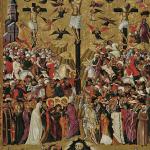Do Muslims and Christians worship the same God? The answer to the question is controversial. Most Muslims answer yes, following a passage in the Koran that appears to say that both groups do worship the same God. Many Christians, on the other hand, vigorously dispute this claim. Yet it is not clear what exactly this denial is based on. After all, Christians do not dispute that Muslims worship God, after all, and since there is, in fact, only one God, it would seem to follow that Christians (who worship God) and Muslims (who worship God) must be worshiping the same entity, no matter how different their conceptions of Him may be.
I used to think that the above argument was sufficient to show that Muslims and Christians did worship the same God. Since then, however, I have come to think the matter a bit more complicated. As I now see it, whether the claim “Muslims and Christians worship the same God” is true will depend on two things: 1) whether the statement is being made de dicto or de re, and 2) whether the word “God” is taken to be a name or a description.
The God Delusion
In Acts 14:8-15, we find Paul and Barnabas caught up in a very strange case of mistaken identity:At Lystra there was a crippled man, lame from birth, who had never walked. He listened to Paul speaking, who looked intently at him, saw that he had the faith to be healed, and called out in a loud voice, “Stand up straight on your feet.” He jumped up and began to walk about. When the crowds saw what Paul had done, they cried out in Lycaonian, “The gods have come down to us in human form.” They called Barnabas “Zeus” and Paul “Hermes,” because he was the chief speaker. And the priest of Zeus, whose temple was at the entrance to the city, brought oxen and garlands to the gates, for he together with the people intended to offer sacrifice. The apostles Barnabas and Paul tore their garments when they heard this and rushed out into the crowd, shouting, “Men, why are you doing this? We are of the same nature as you, human beings!”
Undoubtedly the incident was quite embarrassing for all parties involved. But suppose we look at things from a philosophical perspective and ask: were the Lyconians in this story worshiping Zeus and Hermes, or Paul and Barnabas?
The answer would seem to be: it depends. If we look at things from the perspective of the Lyconians, then they were, of course, worshiping Zeus and Hermes. That is who they took the two figures before them to be, and that is who their worship was mentally directed towards. On the other hand, we might equally well say that the Lyconians were worshiping Paul and Barnabas, not Zeus and Hermes. After all, the Lyconians were worshiping two particular people, and those two people, contrary to whatever the Lyconians might have thought, were actually Paul and Barnabas, not Zeus and Hermes. So the claim “the Lyconians were worshiping Zeus and Hermes in Acts 14” is true in one sense, false in another. Philosophers call these two different ways of understanding a claim interpretation de re (literally “of the thing”) and interpretation de dicto (literally “of the word”).
Now consider another case: A man, sick with a high fever, begins to hallucinate. In this hallucination, God appears and talks to him. Does the man with the fever talk to God? As with the case of Paul and Barnabas in Lystra, the answer is that it depends. De dicto the answer is yes, the man does talk to God. De re the answer is no, he is only talking to thin air. We might put things crudely by saying that the man thinks he is talking to God, but in reality he is only talking to an illusion.
How does all this relate to the “same God” question? Well, while Christians have different views as to the origins of the Islamic religion, few of them believe that God actually appeared to Muhammad in the desert or that he received any special revelations from God as Muslims believe that he did. Some Christians might say that Muhammad was hallucinating; others that he was lying; I’ve even seen some Christians argue that something supernatural did appear to Muhammad, but that it was not heavenly in origin. But in any case, the vast majority of Christians wold agree that the Koran does not represent a revelation from God, and that whatever Muslims (or even Muhammad himself) might mistakenly think, God did not actually talk to Muhammad.
Thus, it would seem that my argument for the claim that Muslims and Christians worship the same God rests on an equivocation. While everyone would agree that Muslims worship God de dicto, not everyone would agree that they worship God de re. In the latter sense, some might say, it is not accurate to claim that Muslims worship God. What they worship is an illusion, a non-existent being. So from the fact that there is in actuality only one God, it does not follow that Christians and Muslims both worship that God.
But before we get ahead of ourselves, let’s consider the other distinction I mentioned at the beginning of this discussion: the distinction between “God” taken as a name and “God” taken as a description.
What’s in a Name?
As philosophers ranging from Saul Kripke to Linda Richman have noted, there is a great deal of difference between names and descriptions. Names are what Kripke calls “rigid designators.” They pick out a particular person or thing or kind of thing, and refer always to that thing, regardless of what other attributes the person, thing, or kind of thing may have. Descriptions, by contrast, refer to particular attributes and may apply to a person, thing, or kind of thing at one time but not another. “George W. Bush”, for example, is a name; “President of the United States”, by contrast, is a description. “Holy Roman Empire” is a name; “a holy, Roman empire” is a description.
Most people, I take it, tend to assume without reflection that “God” is a name like “John” or “Steve” or “Sally.” For the scholastics, however, “God” was not a name, but a description, meaning something along the lines of “supreme being,” or, to use St. Anselm’s more precise terminology, “that than which no greater can be conceived.”Whether the claim “Muslims and Christians worship the same God” is true will depend on whether “God” is understood as being a name (e.g. the being who appeared to Moses in the burning bush, etc., or the being who revealed himself to Muhammad in the dessert, etc.) or as a description (e.g. “the supreme being”). If God is taken to be a name, then the claim will be true de dicto when made by Muslims (who believe that the same being revealed himself to Moses and to Muhammad), false de dicto when made by most non-Muslims (who don’t believe the same being revealed himself to Moses and Muhammad), and false de re (on the supposition that Islam is not the true religion). On the other hand, if “God” is taken to be a description, then the claim would be true de re (since Muslims and Christians both believe in a supreme being, and there is in fact only one such being), and while whether the claim was true de dicto would vary from person to person, the claim would seem to only be false de dicto for someone who was confused or mistaken about the issue.
Personally I am inclined to think that St. Anselm is right, and that the word “God” is not a name like Jesus or Shiva. To use an admittedly very weird example, if it turned out that Jesus was actually a time traveler who used his advanced technology to perform the miracles depicted in the Gospels, we would not say that there was no Jesus but that Jesus was actually a time traveler. But if it turned out that all of the actions and words attributed to God in the Scriptures were actually the words and actions of this time traveler, we would not say that God was actually a time traveler. We would say that there was no God (or, at least, that it wasn’t really God who did all of these things).
As such, I have no problem with saying that Muslims worship the same God as Christians, or that Hindus worship this same God, or that any group that worships a supreme being worship the same God as do Christians. But I recognize that someone might take a different view on this, and so I cannot say that the “same God” question is as open and shut as I had previously supposed.
Thoughts?















